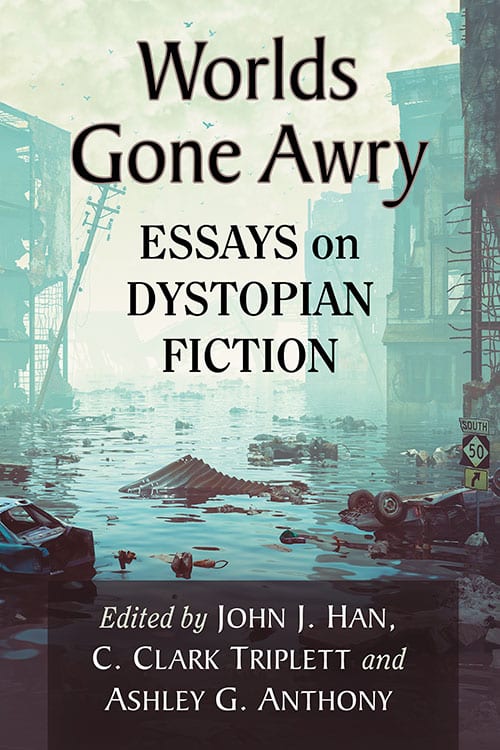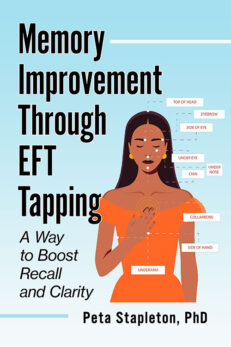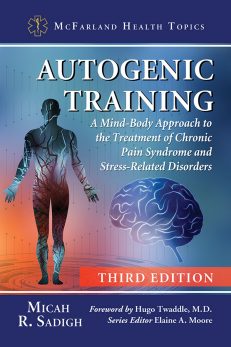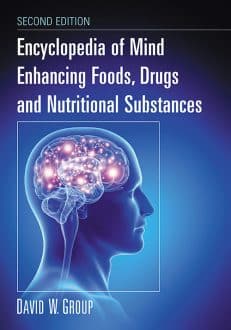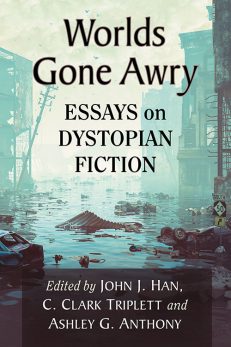Worlds Gone Awry
Essays on Dystopian Fiction
Original price was: $39.95.$19.99Current price is: $19.99.
In stock
About the Book
Dystopian fiction captivates us by depicting future worlds at once eerily similar and shockingly foreign to our own. This collection of new essays presents some of the most recent scholarship on a genre whose popularity has surged dramatically since the 1990s. Contributors explore such novels as The Lord of the Flies, The Heart Goes Last, The Giver and The Strain Trilogy as social critique, revealing how they appeal to the same impulse as utopian fiction: the desire for an idealized yet illusory society in which evil is purged and justice prevails.
About the Author(s)
Bibliographic Details
Edited by John J. Han, C. Clark Triplett and Ashley G. Anthony
Format: softcover (6 x 9)
Pages: 259
Bibliographic Info: notes, bibliographies, index
Copyright Date: 2018
pISBN: 978-1-4766-7180-2
eISBN: 978-1-4766-3377-0
Imprint: McFarland
Table of Contents
Acknowledgments vii
Introduction (John J. Han, C. Clark Triplett and Ashley G. Anthony) 1
Part One: Classical Dystopian Fiction
Feminine Subterfuge in Margaret Atwood’s The Heart Goes Last (Megan E. Cannella) 15
“Forget sad things”: Kurt Vonnegut’s Dystopian Short Fiction as Social Critique (Ashley G. Anthony) 28
“A secure but partly demented society”: Reconsidering Human Depravity in William Golding’s Lord of the Flies (Natasha W. Vashisht) 40
Streets of Spectrality: Kevin Barry’s Dystopian City of Bohane (Deirdre Flynn) 56
Interrogating Utopia: On Colin MacInnes’ Absolute Beginners (Andrew Hammond) 69
“What if I said that he’s a god?”: Messianism in Cormac McCarthy’s The Road (Wes Yeary) 88
“Maps and mazes”: Mapping as Metaphor in Postsecular America (Harold K. Bush) 100
Part Two: Popular Dystopian Fiction
Unmasking the Deception: The Hermeneutic of Suspicion in Lois Lowry’s The Giver (C. Clark Triplett and John J. Han )111
Ending Dystopia: The Feminist Critique of Culture in Suzanne Collins’ Hunger Games Trilogy (Jane Beal) 122
Commodifying the Revolution: Dystopian Young Adult Literature and Cultural Critique (Jillian L. Canode) 139
Dystopia, Competition and Reality Television Tropes in The Bachman Books: “The Long Walk” and “The Running Man” (Alissa Burger) 150
Stranger Than Fiction: Locating the Digital Dystopia in Contemporary Fiction (Robyn N. Rowley) 163
Disembodied Heads and Headless Philosophies: C.S. Lewis’ Aesthetic Rejoinder to Dystopian Utility in That Hideous Strength (Matthew Bardowell) 178
The Creation of the Future from Remnants of the Past: Order from Disorder in William Gibson’s All Tomorrow’s Parties and Neal Stephenson’s Snow Crash (Melanie A. Marotta) 196
The Future Is White, the Future Is Undead: Reframing the American Vampire Dystopia in Guillermo del Toro and Chuck Hogan’s The Strain Trilogy (Simon Bacon) 210
Here’s Looking at You, Kids: The Urgency of Dystopian Texts in the Secondary Classroom (Michael A. Soares) 225
About the Contributors 245
Index 248
Book Reviews & Awards
- “A solid collection and is especially useful because of the range of authors and titles covered…an especially informative study…the quality of essays is high, and the editors deserve credit for producing a volume that appears to be scrupulously proofread”—Science Fiction Studies

